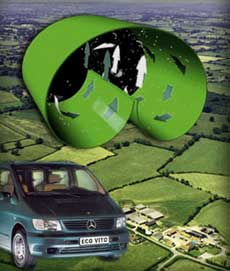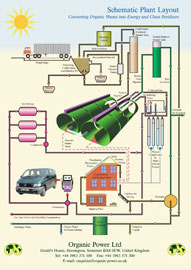Time and date
CONSTRUCTION DIRECTORY
Organic Power Projects Ltd Contact Details
Address
Hamilton House
80 Strokes Croft
80 Strokes Croft
Bristol
BS1 3QY
England
About Organic Power Projects Ltd
Organic Power Projects Ltd is a member of the Connolly and Callaghan Group. It was formed to commercialise the patented Maltin® System for the anaerobic digestion of organic material and holds the head licence for the manufacture and sale of this system.
Our Mission
Our vision is to use environmentally friendly technologies to provide reliable, renewable energy to communities throughout the world.
In this way we shall encourage sustainability and enhance standards of living.
ANAEROBIC DIGESTION
Similar in some respects to composting, but in tanks from which oxygen is excluded, anaerobic digestion is the breaking down of organic material (i.e. from plants and animals) to simpler chemicals by bacteria. While the bacteria of composting use oxygen to produce carbon dioxide from plant material, the anaerobic bacteria create methane (an energy-rich gas) in addition to carbon dioxide. After digestion, the remaining material consists of nutrient-rich fertiliser suspended in water. This can be used for soil improvement, or optionally the dry material can be separated from the water for resale and the water can be used as grey water or cleaned further to be potable.
THE MALTIN® SYSTEM
British engineer Christopher Maltin spent over 18 years in worldwide research of all of the methods available to generate renewable energy. He recognised that the anaerobic digestion of waste offered the most effective solution and he has designed a system with a number of innovative features that overcome practically all of the issues of current systems.
Benefits to customers
With oil and gas scarcity becoming a reality, it is increasingly valuable to produce your own renewable energy using a profitable system that can pay for itself remarkably quickly. Depending on your circumstances, you may be able to save on your electricity and heating bills, reduce waste disposal costs, run your own vehicle fleet on gas and earn money from the outputs. Your production of electricity can even qualify for double ROCS (''Renewables Obligation Certificates'').
The patented Maltin® System is ideal for:
At present there are large quantities of bio-waste from farming, food processing and municipal sources that are being disposed of at significant cost. Producers of waste have to pay the waste processors to accept materials, with costs rising rapidly as landfill taxes increase every year. Currently much of this waste is composted or sent to landfill, where it rots, emitting biogas, primarily carbon dioxide and methane.
Anaerobic digestion captures this biogas. After due processing, the methane can be used for such purposes as:
Except for wood, hair and bone, almost any organic material is commercially viable for anaerobic digestion. Possible commercial feedstocks include:
Our Mission
Our vision is to use environmentally friendly technologies to provide reliable, renewable energy to communities throughout the world.
In this way we shall encourage sustainability and enhance standards of living.
 |  |
ANAEROBIC DIGESTION
Similar in some respects to composting, but in tanks from which oxygen is excluded, anaerobic digestion is the breaking down of organic material (i.e. from plants and animals) to simpler chemicals by bacteria. While the bacteria of composting use oxygen to produce carbon dioxide from plant material, the anaerobic bacteria create methane (an energy-rich gas) in addition to carbon dioxide. After digestion, the remaining material consists of nutrient-rich fertiliser suspended in water. This can be used for soil improvement, or optionally the dry material can be separated from the water for resale and the water can be used as grey water or cleaned further to be potable.
THE MALTIN® SYSTEM
British engineer Christopher Maltin spent over 18 years in worldwide research of all of the methods available to generate renewable energy. He recognised that the anaerobic digestion of waste offered the most effective solution and he has designed a system with a number of innovative features that overcome practically all of the issues of current systems.
Benefits to customers
With oil and gas scarcity becoming a reality, it is increasingly valuable to produce your own renewable energy using a profitable system that can pay for itself remarkably quickly. Depending on your circumstances, you may be able to save on your electricity and heating bills, reduce waste disposal costs, run your own vehicle fleet on gas and earn money from the outputs. Your production of electricity can even qualify for double ROCS (''Renewables Obligation Certificates'').
The patented Maltin® System is ideal for:
- Waste management for local authorities
- Agriculture, particularly cattle, pig and chicken farms
- Manufacturers who are substantial users of energy
- Food retailers and manufacturers who have organic waste streams, including the dairy and meat industries and
- Community and social uses, such as eco-friendly home builders and the Transition Towns Network
- Renewable energy providers
At present there are large quantities of bio-waste from farming, food processing and municipal sources that are being disposed of at significant cost. Producers of waste have to pay the waste processors to accept materials, with costs rising rapidly as landfill taxes increase every year. Currently much of this waste is composted or sent to landfill, where it rots, emitting biogas, primarily carbon dioxide and methane.
Anaerobic digestion captures this biogas. After due processing, the methane can be used for such purposes as:
- generating electricity: unlike solar and wind power, methane is available 24 hours each day
- cooking and heating (it is similar to ''natural gas'')
- transport: car and truck engines can be converted to run on methane
Except for wood, hair and bone, almost any organic material is commercially viable for anaerobic digestion. Possible commercial feedstocks include:
- Cattle and pig slurry
- Crops (such as maize or algae) grown for the purposes of renewable energy production
- Food wastes from agriculture, retail out-dated stocks and sorted-at-source municipal collections
- Abattoir waste, such as blood and offal
- Lactose products, from the dairy industry, including the waste from cheese manufacturers
- Liquid by-products of brewing and distilling
- Glycerol, which is a waste product of the manufacture of bio-diesel

















